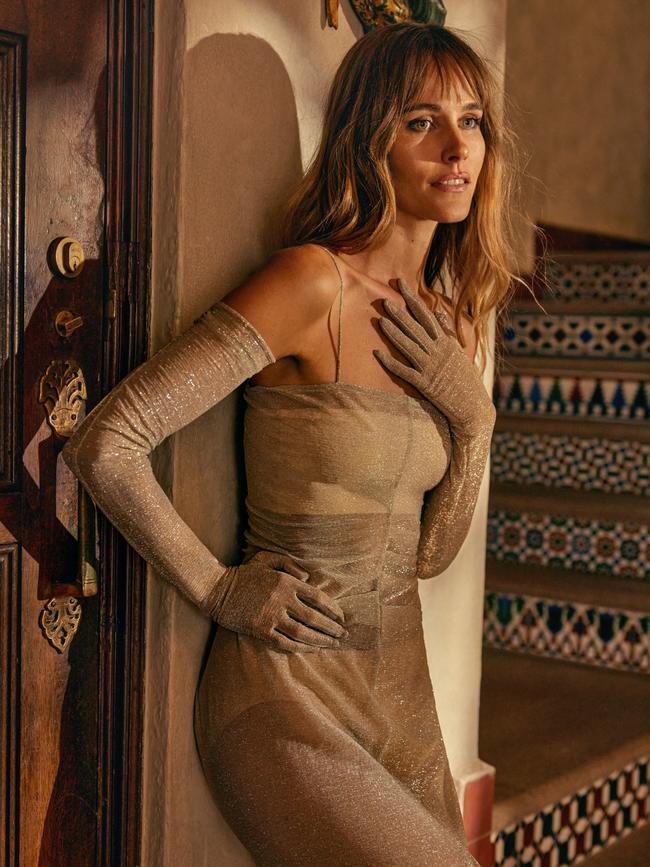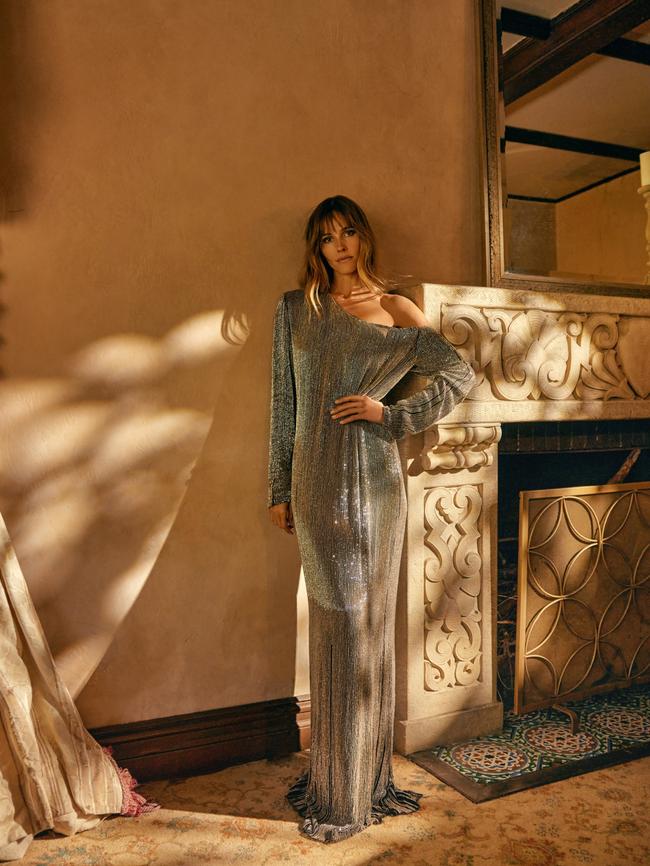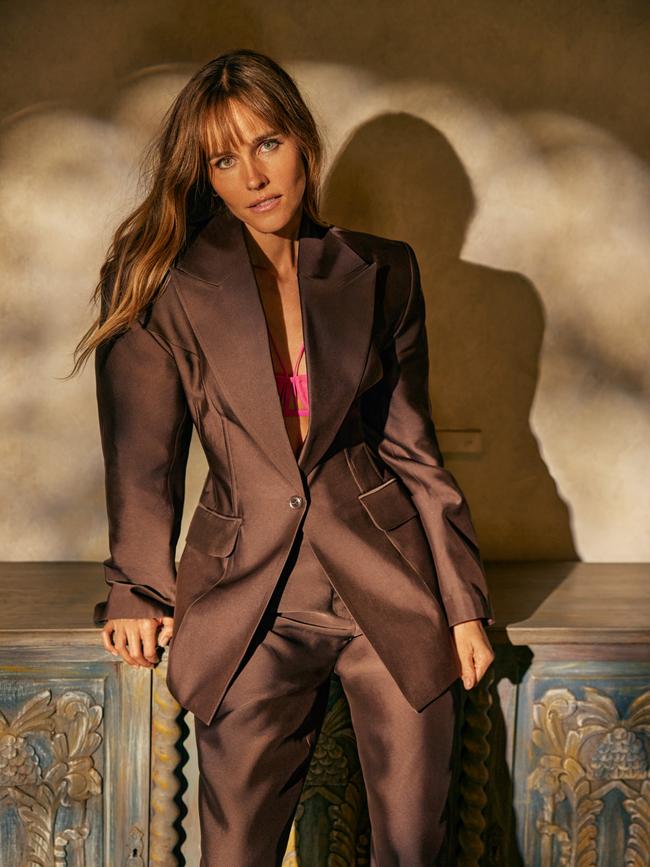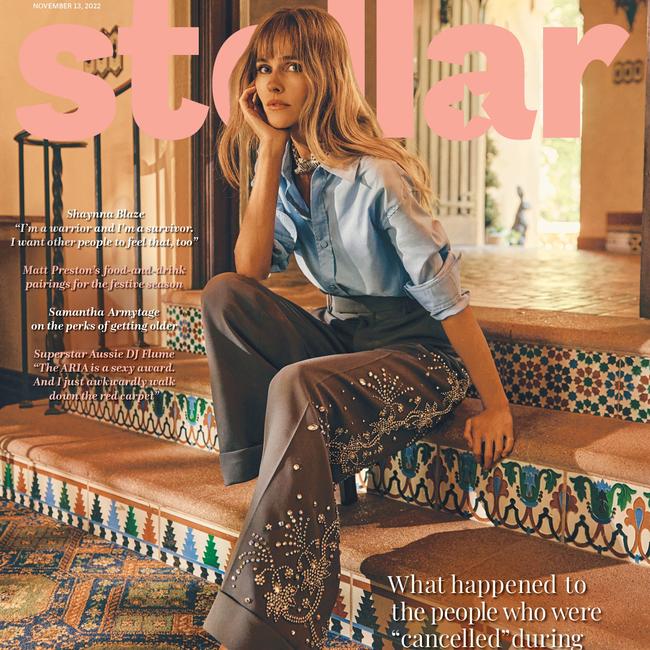Isabel Lucas on the decision that nearly ended her career
Actor Isabel Lucas has opened up about why she put her career on the line to speak out about the Covid vaccine, in a tell-all exclusive.
Stellar
Don't miss out on the headlines from Stellar. Followed categories will be added to My News.
When Isabel Lucas stepped onto the shores of Summer Bay in 2003 as intriguing ingénue Tasha Andrews in Home And Away, she became a teen sensation. Not long after, she was starring in both Hollywood blockbusters and prestige films, and as her fame grew, she garnered a copious amount of media ink about who she was dating, how she stayed fit and what her future roles would be. But when Lucas publicly expressed her views on Covid vaccines in 2020, that positive attention turned into potentially career-stifling notoriety. Back from the brink of being cancelled, the 37-year-old actor answers the questions that have plagued her ever since and reveals to Stellar why she was willing to risk her livelihood
Stellar: Isabel, you’ve had a spotlight on you since you first appeared on Home And Away in 2003 before moving to Los Angeles and starring in Transformers: Revenge Of The Fallen. But in the past three years, there has been a different type of spotlight where it’s been not about your work as an actor and an artist but about your personal beliefs and how you spoke out against the Covid vaccine. Why did you feel the need to speak out?
Isabel Lucas: I was talking with my mum about where it stems from in me to shed light on issues that I’m passionate about and care a lot about.
You know, why did I go to Japan to paddle out with the dolphins (in 2007)? Why have I had this really fierce need to speak to environmental topics?

I remembered this experience my sister and I had when we were living in Kakadu National Park when I was nine. We were at the local pool and there was one of the kids from school.
He was like a big, strong kid and probably had suffered some kind of abuse. He had caught this beautiful green tree frog and he was tormenting it while the kids around him egged him on.
I remember going home that day and my sister and I both cried in the room because we didn’t say something (to stop him).
My conscience was screaming: this isn’t OK, and I could have done something. I could have said something and I wasn’t brave enough and I made a promise to myself that I won’t do that again. I will always speak up, even if my voice is shaking.
S: This publication has a pro-vaccination stance (as does the publisher of Stellar, News Corp Australia) and we supported the Covid vaccine throughout the pandemic. So we need to ask: are you vaccinated?
IL: Not against Covid. Growing up, I’ve had several attenuated vaccines. I’m pro engaging in conversations about inclusion and diversity, about how one size doesn’t fit all.
For me, I appreciate what might be right for you may not be right for me, but it’s not right that either of us are being stripped of the freedom to choose.
I feel that strongly. And trust me, I avoid conflict at all costs, but there’s been, in my experience over the past two or three years, a grand contradiction in our culture where everyone is finally talking about diversity and inclusion, and it’s such a wonderful thing to celebrate.
But how does that really play out in real life? Our relationship with our body is very personal and it’s deeply complex and so are our choices, and we’re claiming to engage in conversations about inclusion and diversity – you know, gender, religion, sexuality, race – without allowing our beliefs or observations to be acknowledged.
The diversity of choice is yet to be included, in my experience. There’s an expectation to be vulnerable and honest and open and share observations and truth.
But in the same breath, if we do that in a more nuanced or complex way than the current popular view, then one can end up as a part of the cancel-culture moment.
S: Did you know that by voicing your opinion on this issue, that you may be cancelled or may not work again?
IL: Of course. I thought: it’s highly likely I won’t work for years if I share this.
There’s a sentiment (by English author) Evelyn Beatrice Hall: “I (disapprove of) what you say, but I will defend to the death your right to say it.” It’s a really dear one to me.
For me, the risk of not sharing and speaking my observations was far greater to my conscience. Was I aware it would be risky? Highly, highly aware. Of course. Absolutely.
While the past three years have been challenging, I’m so grateful for the lessons I’ve learnt and I’ve never felt more supported.
It was ironic because after I had shared my observations, the role in Bosch & Rockit (a surf drama that was in cinemas in August) was offered to me.
The (makers) were also questioning things deeply and wanted to express appreciation for my observations and generate deeper questioning, and that was certainly an unexpected gift.
I was very prepared for different outcomes because I know going against the grain, against the mainstream narrative, is controversial. Blind obedience to authority is controversial.
S: How do you reconcile that your stance against the vaccine might have caused harm to someone else?
IL: It’s not always easy to have these conversations. I’ve always lived by the sentiment that the more we don’t want to talk about something, the more we probably need to. We need to bring patience. We need to bring inclusion and we do need to talk about it.
For me, the ultimate test of something is, “Does it work? Does it produce the result intended?”

S: But what about in terms of someone’s livelihood? In NSW, lockdown laws were lifted once a percentage of the population was vaccinated. How, as a conscientious person, do you reconcile the fact that your personal choice may harm the greater good?
IL: You could even ask the same question of what the sacrifices could be for those including myself possibly not working for years ahead.
What I’ve learnt is that love is inclusive. It’s not coercive or it’s not inherently taking something away from us if we don’t do something. The fabric of society – in that instance, in that moment in time – didn’t feel about inclusion. It felt coercive.
And if we want an inclusive community, society and world, we need to be an example of that. It’s to include rather than discriminate. I’ve spent years aspiring to learn how to adhere to that quiet inner voice.
I’ve always been highly sensitive and guided by my intuition. I’ve based a lot of my choices and my decisions in my life purely on this internal compass.
I’ve learnt how to listen to it and how to adhere to it and I also learnt that when I don’t listen to it, there are negative repercussions. I’ve learnt this through experience, living in Hollywood. I’ve learnt to hone this instinct.
S: How so?
IL: I was at a Hollywood dinner and my US publicist encouraged me to go and speak to a well-known producer, to “get in his orbit” and talk professionally.
And I recall it vividly, standing in front of this person, wanting to acknowledge my respect for what they had created through their legacy of films, and simultaneously being highly aware that my body wanted to exit.
I remembered trying to talk myself into it and saying, this is a professional engagement; this is good to have a conversation, and ignore the signals in my body.
Years later, I had an a-ha moment that confirmed why I had these alarm bells. It’s hard to describe why the body knows what it knows or even explain it. There are just inherent instincts that are so intelligent and are beyond cognitive logical analysis.
All my choices stem from this knowing and from experience.
S: You’ve been based in Byron Bay for seven years after living in America. Why did you return to Australia?
IL: I did own a house in LA, but I didn’t really feel at home. My sister lives in Byron and I’ve got a lot of good friends here.
What I resonate with in this particular shire, and this region, is that there’s a general sense of living in tune with nature and encouragement towards growing organic food, living well, and living in peace and reciprocity with nature.
S: What was it like during the floods?
IL: As a community, we were really stretched and pushed to our limits and it was heartbreaking and simultaneously heartwarming because of the way people showed up and collaborated.
My best friend had five families living at her house for months. And I would say there’s much to repair and heal but we’re also bouncing back beautifully.

S: Byron Bay is now home to a lot of Australia’s best actors, some you’ve worked with, and some you’ve dated, like Chris Hemsworth. Do you catch up?
IL: Working on Bosch & Rockit was wonderful because it was with Luke (Hemsworth), who I’ve known for nearly two decades.
He was so generous as an actor. (The Hemsworths) are a beautiful family, obviously. It’s always nice to run into each other and say hello. And we all appreciate living in this place for the lifestyle. It’s so healthy and I think a lot of people are drawn to that.
S: Do you have plans to move back to the US for work in the future?
IL: It’s been fantastic living back in Australia and working in the Australian film industry, but I absolutely would embrace roles in Europe or the US again.
I’ve got a great community of friends I keep in touch with (over there), and my manager and my agent, they’re based in the US.
S: Having worked with A-list US directors, including Terrence Malick on 2015 drama Knight Of Cups, what do you think the Australian film and television industry should be proud of?
IL: I think we should be proud of our humility. I absolutely love film crews anywhere in the world but particularly Aussie film crews.
There’s a generosity and a decency, and I think it’s an aspect of our culture. I love working at home for that reason.
A few months ago, I was filming Sons Of Summer (a sequel to the cult 1977 surf film Summer City, starring Mel Gibson) and that was an amazing opportunity.
I would sleep at home then drive up to the Gold Coast for the week and shoot scenes paddling in the ocean on surfboards. That’s one of the gifts of filming and working here locally.
S: Any other films you’re working on at the moment?
IL: I’m honoured to co-produce and play the lead in Radiant; it’s a modern portrait of Marie Curie.
Have you always wanted to produce?
IL: I have, and this was the perfect film to come on board. I was recently in Paris and Poland doing some research with the director, Annika Glac, because it’s all being shot in Paris and Poland.
It’s through a new lens of Marie Curie being on the spectrum and how her neurodivergent brain resulted in her being vilified as a woman and an outsider, and which also led to her discovery of a new science in radioactivity.
It’s incredibly poetic and one of the most beautiful scripts I’ve read.
What attracted me to the role of Marie was that she was just a completely modern woman living in a world that wasn’t really ready for her. She was a force of nature.
And yes, she paid a terrible price for what she stood for, but she flipped science on its head and everything that everyone had certainty of.

S: Going forward, are you happy to continue talking openly about your beliefs alongside your work as an actor and an artist?
IL: As an artist, I do resonate very deeply with the fact that there’s 100 ways to approach something. Different horses for different courses, and we’re all individuals.
It’s my job as an artist to question, to unpack things, to edge closer to the truth. Not to confuse, but to encourage society to question.
That’s part of the make-up of an artist – to really question things, even when it’s uncomfortable.





